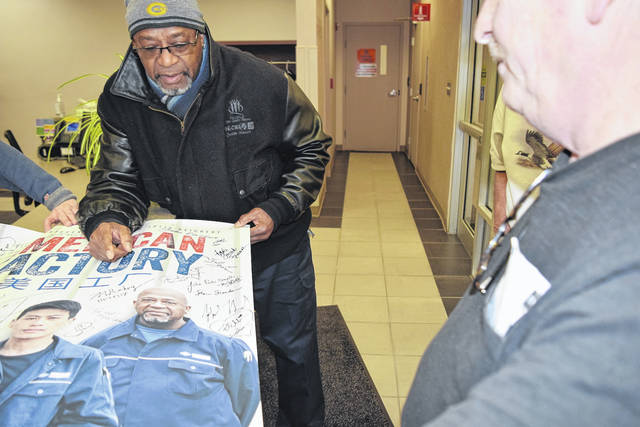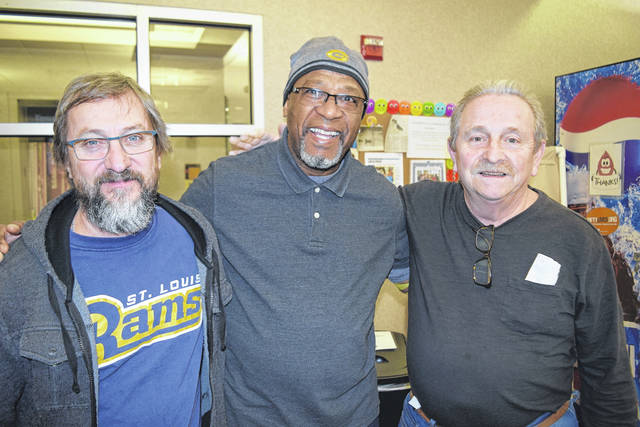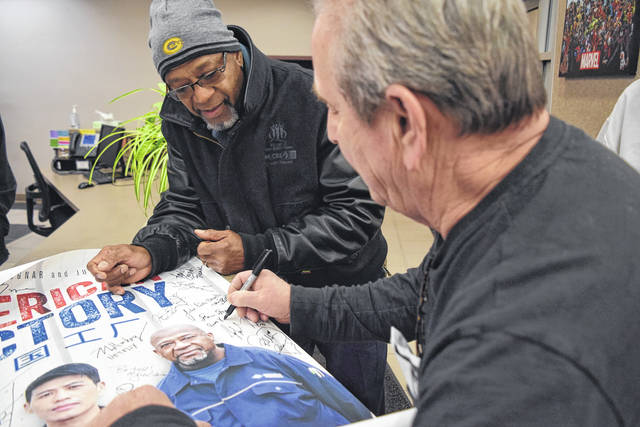


DAYTON — Donors Russell Jenkins and Bobby Allen worked side-by-side for 15 years at GM’s Moraine Assembly Plant and still donate side-by-side at the Community Blood Center. They’re used to being thanked for helping save lives, but after donating Jan. 17 at CBC they were treated more like movie stars.
Both appeared in “Last Truck,” the 2009 Academy Award-nominated documentary of the plant’s closing by Yellow Springs filmmakers Steve Bognar and Julia Reichert. A decade later, Bobby is a hero of the couple’s new, again Oscar-nominated documentary “American Factory.”
“It was a bit part in the last one,” said Bobby. “But it was very special part,” said Russell.
“American Factory” follows the formation of the Chinese-owned automotive glass factory Fuyao Glass America in the same building that had once housed the General Motors bus and truck assembly operation.
The documentary premiered at the Victoria Theatre and was screened at Neon Movies in August 2019. After the Oscar nomination announcement, the Neon decided to bring the film back this weekend for Friday, Saturday and Sunday showings.
Russell made his 206th lifetime donation Friday, joined by his brother Larry making his 158th and Bobby making his 51st donation. “I’ve known Bobby more than 20 years,” said Russell. “My brother’s trying to keep up with me, but he can’t catch me. We all come down here every eight weeks to the day, that’s our plan.”
Russell said he was in much better position to retire after the Moraine Assembly Plant closing. Bobby went a year and a half without work before the opportunity to work for Fuyao. He helped Bognar and Reichert chronicle his experience in the “American Factory,” and now enjoys much more satisfying employment with the Centerville City School district. “I’m so happy to be there,” he said.
“It’s basically about the cultural difference between the Chinese and the American worker, and their treatment,” said Bobby. “It’s a story that needs to be told.”
Bobby unrolled an “American Factory” movie poster, covered with signatures of key contributors to the film project. He directed his friend Russell to a key place to sign it. CBC staff gathered around the celebrity donors.
“Everything is unscripted, and everything is to the heart,” said Bobby. “It took three years to make. At 11:30 at night I would leave work and at 11:15 they (Bognar and Reichert) would be at my house. They talked to me until two in the morning; hours and hours of footage.”
Bobby wants people to see the film and make their own judgements. Russell is more direct. “You work in China, you work seven days a week. You don’t get a day off,” he said. “There are so many people. If you worked in a coal mine and there was landslide, they don’t do anything about it.”
Russell worked 27 years at the Moraine plant, Bobby for 15 years. “We walked out together,” said Russell.
“’Last Truck’ opens with the plant closing,” said Bobby. “Every time I see it, and all the people leaving, it brings tears to my eyes. Of the people in the (‘American Factory’) film, I’m the only one that left and quit. All the rest got fired.”
Bobby credits Fuyao for allowing filmmakers considerable access, and is grateful for the backing of the Obamas’ Higher Ground Productions and Participant Media.
“I’m blessed to be part of this project,” he said. “I’ve been to the Sundance Film Festival, the Cleveland International Film Festival, the Victoria Theatre screening here in Dayton. I was impressed. The line was all the way around the block and turned the corner.”




